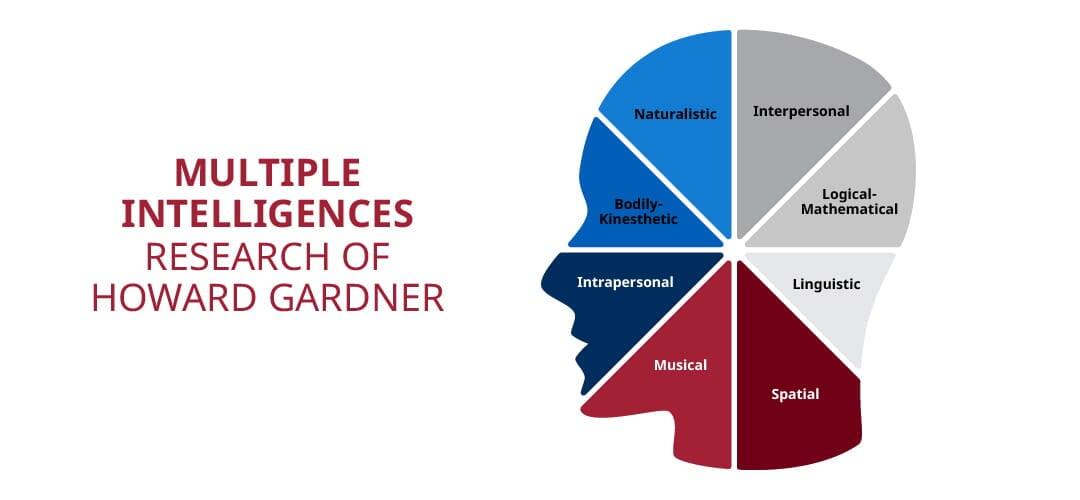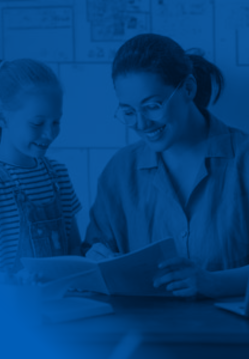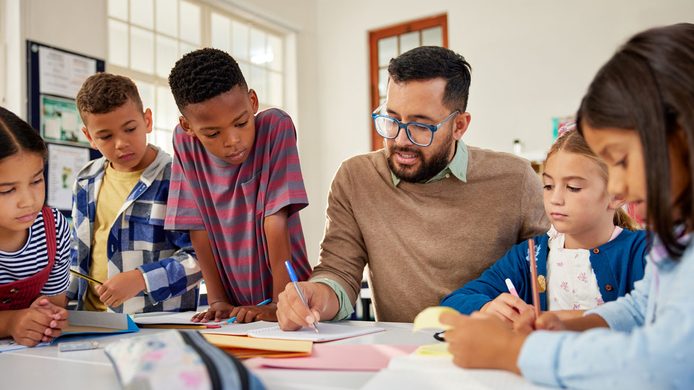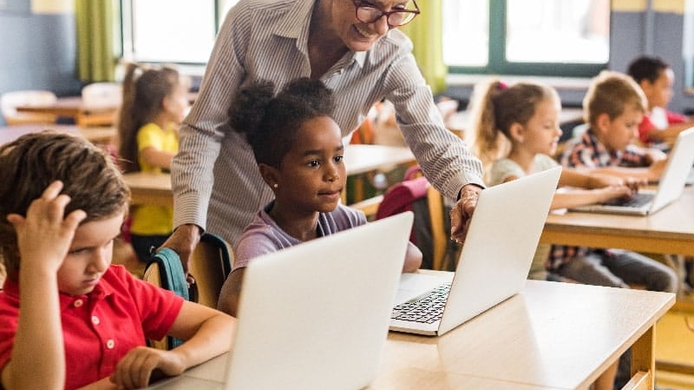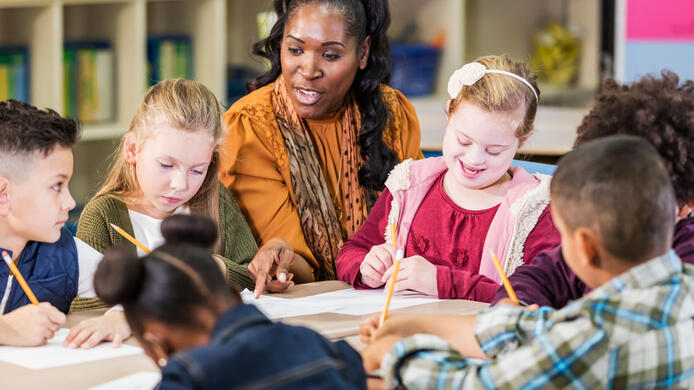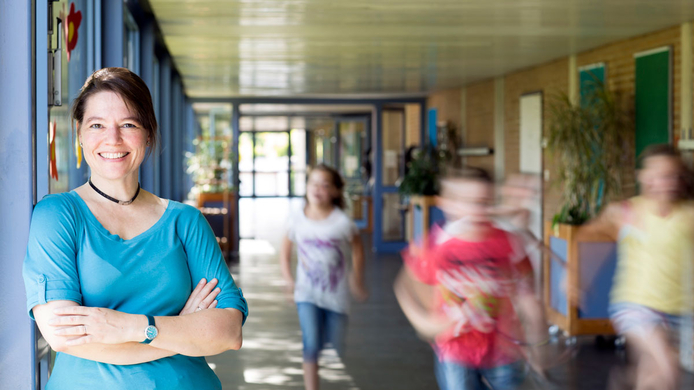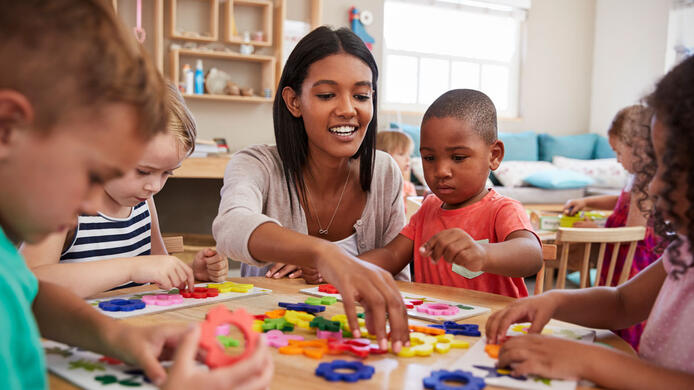Explore our resources for teaching and education degrees and learn about career options that fit your future.
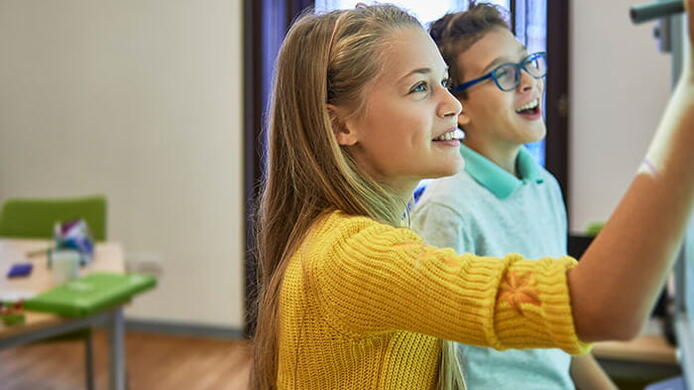
When people think of a teacher at work, they envision someone speaking in front of a room full of students. What they don’t see are the hundreds of hours of lesson planning that happened before the first day of school.
Crafting a year-long curriculum that adheres to testing standards while also being relevant, age-appropriate and engaging for every learner can feel overwhelming. Incorporating universal design for learning (UDL) into the classroom has a lot of benefits for teachers and students alike.
But what is universal design for learning, and how can teachers apply UDL principles in their classrooms? We’re covering the basics of UDL principles, the science behind them and examples of how UDL differs from traditional lesson planning.
What Is Universal Design for Learning?
UDL is a framework designed specifically for educators. It is based on the principles of universal design (UD) that are used in architecture, space planning and product development. Students in every classroom face a variety of barriers that they must overcome to fully engage in a lesson. UD and UDL address factors such as physical, emotional, behavioral, neurological and cultural issues that impact education by promoting equity and inclusion.
In an education setting, UDL requires teachers to optimize their lessons for a variety of learning styles or “modalities” based on scientific brain research about how students learn. The goal is to create an inclusive, flexible lesson from the start, thus proactively eliminating issues.
In a traditional classroom — what most American adults will recognize from childhood — teachers make all the decisions. Any accommodations or changes to the lesson plan are made ad hoc and added in at the end. In UDL, the accommodations are organic and built in from the beginning.
Universal design for learning is unique because it requires teachers to think about the brain in a new way. A UDL-based curriculum would include lessons designed for all eight intelligences, based on Howard Gardner's research on multiple intelligences:
- Interpersonal
- Logical-Mathematical
- Linguistic
- Spatial
- Musical
- Intrapersonal
- Bodily-Kinesthetic
Dr. Paulette Koss, adjunct instructor for University of Massachusetts Global’s School of Education, calls UDL “a revolutionary way of lesson planning.” She believes UDL is more effective and equitable because the needs of all students are accounted for in the planning stage — not tacked onto an existing lesson.
“In the past, traditional lessons were predominantly favoring the linguistic and the logical-mathematical areas of the brain,” Dr. Koss explains. “This only represents two sections of the brain. The other six modalities are traditionally not addressed in lessons.”
This is where UDL methods come into play, incorporating all intelligences instead of just a few.
How Universal Design for Learning Hacks the Brain
The UDL principles are powerful tools for educators looking to create equitable, meaningful and challenging learning environments. The framework is based on scientific insights from a variety of fields, including neuroscience, learning sciences and cognitive psychology.
UDL’s core principle are based on the most widely replicated finding in educational research: that students are highly variable in their response to instruction. Or in plain speak, everybody learns differently.
To address this, UDL guidelines recommend that educators intentionally build out multiple options for students in each of the following brain networks:
- Affective networks: This is the “WHY” of learning. Scholars differ in the ways in which they are engaged or motivated to learn. Providing multiple options for engagement can help stimulate interest and motivation for learning.
- Recognition networks: This is the “WHAT” of learning. Students differ in the ways that they perceive and comprehend information that is presented to them. Presenting information and content in different formats can help students make connections within and between concepts.
- Strategic networks: This is the “HOW” of learning. Learners differ in the ways they can navigate their learning environments and express what they know. Providing multiple means of action and expression enables all learners to demonstrate their understanding in the most optimal way for them.
Benefits of Using Universal Design for Learning in Your Classroom
UDL principles lead to growth and new skills for teachers and students alike. Teachers are human, which means they tend to instruct using the methods that come most naturally to them. Likewise, students learn best in the styles they are most comfortable with. UDL lesson plans encourage growth and development through new ways of teaching and learning.
Additionally, UDL benefits the classroom by:
- Allowing students to use their strengths while also working on deficiencies
- Helping teachers recognize the variability and diversity of individual brains
- Emphasizing the need to proactively plan for a variety of learning styles, thus reducing barriers to education
- Fixing the curriculum and not the student
- Treating each learner as uniquely capable
- Shaping young students into Expert Learners
- Including accommodations for students with disabilities and second language to help them fully access the curriculum
“When we talk about Expert Learners, the ultimate goal of UDL is to have students utilizing all aspects of their neural pathways, being engaged on all neural levels and being in charge and empowered for their own learning,” explains Dr. Koss.
Traditional Lesson Planning vs. Universal Design for Learning
UDL is the inverse of the traditional lesson plan. It might take longer to plan UDL courses, but it is a proactive investment in your classroom. Building inclusivity and flexibility into your curriculum gives you more time to focus on engaging with students instead of removing barriers you hadn’t considered.
If you’ve never created a UDL lesson plan, it can be difficult to imagine what it looks like. To help illustrate how this compares to traditional lesson planning, consider the following UDL examples:
| Traditional Example | UDL Example |
| Students are assigned to write a report on a given topic. | Students are assigned to choose from one of several formats on a given topic (i.e., report, video, slideshow, poster, song, etc.). |
| Teacher designs the lesson for an “average” student and focuses on what subject is taught. | Teacher designs the lesson for multiple types of learners and focuses on what subject is taught while allowing student input on how it is taught. |
| The classroom has desks lined up facing the front, and everyone is taught at once. | The classroom setup is flexible, allowing the teacher to move among multiple spaces dedicated to individual, small or large group work. |
| Students receive scores and feedback on tests, quizzes and assignments, checking grades or discussing goals periodically. | Students collaborate with the teacher to identify what their learning goals are and are encouraged to reflect on what they’re learning. Grades are only one part of the conversation, and feedback is ongoing. |
It is important to note that you don’t need to do everything perfectly on every lesson to incorporate UDL into your classroom. Shifting your mindset is an ongoing endeavor that will happen over time.
Encourage Growth Among All Learners
As a teacher, you work hard to create an inclusive learning environment where all students can come as they are and thrive. Being open to fresh ideas and willing to learn new skills is essential to being an effective educator.
Universal design for learning is an effective way to improve equity and access for all students. Learn more about how you can further increase your influence within your classroom and beyond in our article, “5 Ways Educators Can Benefit From a Doctorate in Organizational Leadership.”

